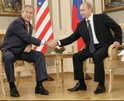Last month's uranium smuggling episode in Georgia has renewed concerns about nuclear terrorism. In that incident, a rogue Russian trader sought to sell 100 grams of highly enriched uranium on the local black market. According to the International Atomic Energy Agency (IAEA), the primary multinational institution involved in these issues, 662 confirmed cases of smuggling of radioactive materials occurred between 1993 and 2004. The U.S. Department of Homeland Security (DHS) recorded 215 reported incidents of nuclear trafficking in 2005 alone (though it is unclear whether the increase resulted from more sales attempts or improved detection and reporting procedures). At the late January 2007 meeting of the World Economic Forum in Davos, Switzerland, DHS Secretary Michael Chertoff warned that the inexorable advance of technology would allow "even a single individual, and certainly a group" to cause an unprecedented level of destruction. A few weeks later, two influential think tanks engaged in researching international security issues -- the East-West Institute and Britain's Chatham House -- published reports that also expressed alarm about the growing risks of nuclear terrorism.
Nuclear Terrorism: New Threats, New Initiatives

